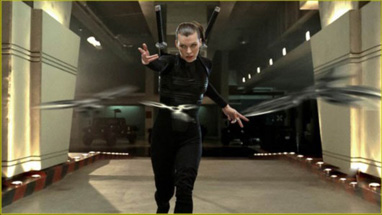Movie Review - Resident Evil: Afterlife
By Matthew Huntley
September 21, 2010
BoxOfficeProphets.com

Let me start off by saying the movie isn’t overtly bad or offensive; it’s just pointless and completely forgettable. I guess it’s supposed to stand out among its brethren because it was filmed using James Cameron and Vincent Pace’s revolutionary 3D technology, but 3D or not, there has to be some sort of story to hold things together, and all Afterlife offers is scene after scene of routine action, violence and stunts. The photography is murky, the script is laughable and the acting is…well, it’s the type of acting you’d expect to see in a Resident Evil movie, which should tell you enough. I know - like most movies adapted from video games, this one is supposed to be mindless fun, but the problem is Afterlife only gets one half of the equation right.
If you’re new to the series, you need not have seen the previous movies to follow this one. The plot more or less picks up where Resident Evil: Extinction left off, and once again, Alice (Milla Jovovich), the indestructible heroine, delivers an opening monologue that tells us about the deadly outbreak that spread across the world and infected people with the T-virus. “Everybody died,” she says, “the trouble was, they didn’t stay dead.” Instead, they turned into zombies, while the Umbrella Corporation, the evil empire that manufactured the virus, fled underground, absolving themselves of their apocalyptic responsibility.
Alice, along with several clones of herself, invades the company’s headquarters and seeks revenge against the leader, Wesker (Shawn Roberts). After some standard gun battles, a huge explosion and a plane crash, she inexplicably emerges from the rubble and starts looking for her friends and other survivors at a supposed safe haven called Arcadia. She manages to find Claire (Ali Larter), who’s been drugged by Umbrella with some sort of spider device, and the two fly to a devastated Los Angeles. Here, they meet a small but diverse group of survivors (if there are going to be survivors, it’s best they are all from different backgrounds). They all take refuge in an abandoned prison surrounded by the undead.
The plot plods along as the group tries to find their way to a supposedly safe ship off the coast, but not without first doing battle with more zombies, including a monstrous one with a giant axe and others with extra tongues coming out of their mouths. Of course, all this is meant to utilize the 3D technology, but if I don’t care about anything taking place on-screen or fail to get excited about it, the presentation is irrelevant.
Like many horror franchises, Resident Evil: Afterlife serves no narrative purpose and has no consequence. Even if the heroes defeat the villains, the filmmakers are free to throw in any twist they want just to guarantee another sequel. If that’s the case, then what’s the point? By the end, the characters may have gotten a little closer to their destination, wherever that may be, but the villain still manages to escape and the closing shot suggests there’s more trouble on the way.
When movies reach such a point, they have to work extra hard to be stimulating and dazzle us with their style and special effects. And while these qualities are somewhat entertaining in Afterlife, they’re hardly enough to recommend the movie. Extinction had more memorable scenes in it and it didn’t need to resort to 3D.
Ultimately, this is just another pedestrian installment in a franchise that nobody neither loves nor hates. A lot of work has clearly gone into the production, but the finished product yields no effect worth writing home about. That’s because we know any investment we give to the story or characters can be taken away from us at any moment, and without some sort of reliance on a better or more worthwhile payoff, there’s little reason to keep seeing these movies. And yet, they just keep making them.